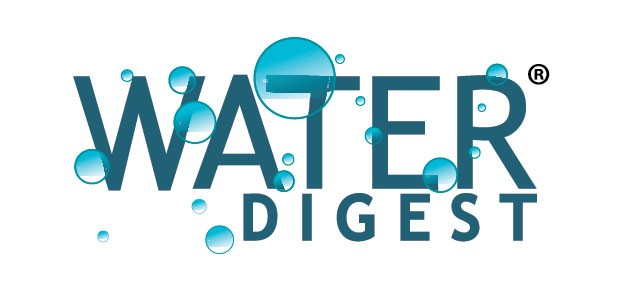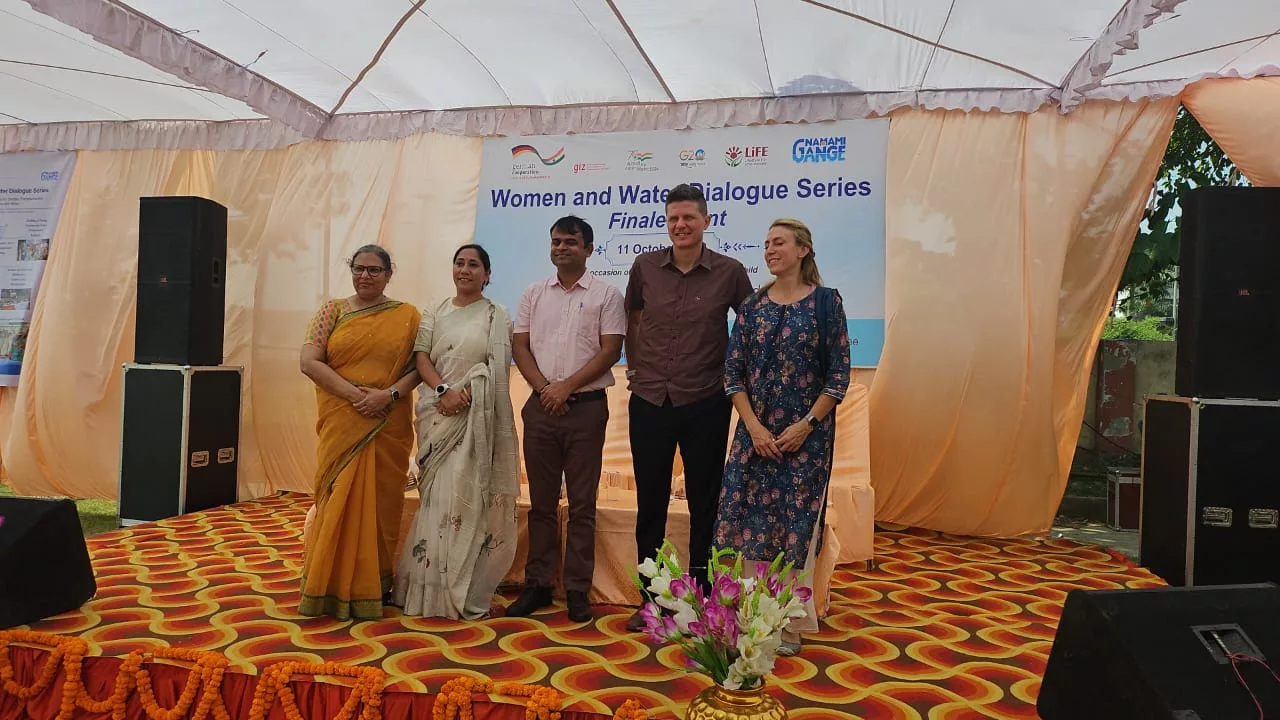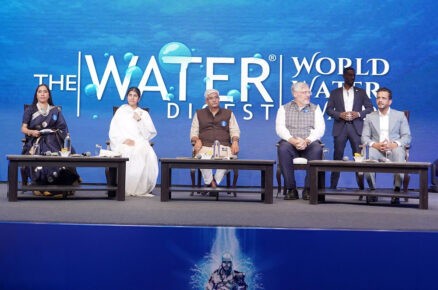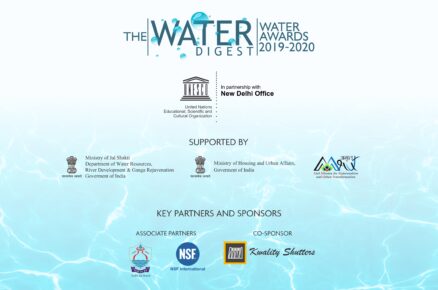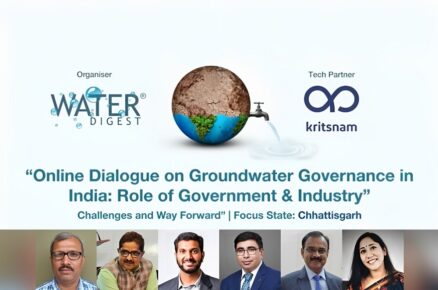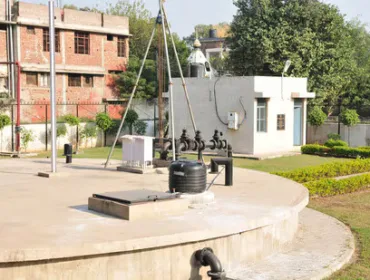On the occasion of ‘International Girl Child Day’ (October 11, 2023), the National Mission for Clean Ganga (NMCG) and GIZ India organised the Finale event of the ‘Women and Water’ Dialogue Series at Boat Club in Prayagraj, Uttar Pradesh. The series, under an Indo-German bilateral cooperation project marked a significant milestone in the ongoing efforts to address water-related issues in India with a focus on women’s participation and engagement in the sector.
The ‘Women and Water’ Dialogue Series served as a prominent platform to not only recognise but also celebrate the invaluable contributions of women working in various capacities within the water sector. It also shed light on the myriad challenges that women face in their roles related to water management. This series, spanning across multiple locations within the Ganga Basin, featured a range of in-person and hybrid events, including panel discussions, side events, and cultural presentations, making it a vibrant and informative initiative. The objective was to highlight the indispensable role of women in the water sector and create a space for women’s voices and experiences to be heard, all with the aim of achieving greater gender inclusivity in decision-making processes related to water management.
The finale event commenced with an opening session moderated by Ms. Anupama Madhok, Director of Water Digest. During this session, she emphasised the pivotal role of women in the water sector and highlighted that the “Women in Water” series serves as a stepping stone rather than a conclusion in advancing the cause.
Ms. Anjana Pant, Technical Advisor at GIZ, emphasised how the series had been pivotal in revealing the challenges that women face at both grassroots and senior levels. She further mentioned that during this finale event, group activities will help developing actionable solutions to address challenges that women face in the sector.
Mr. Christian, Director of the Sustainable Development Cluster at GIZ, touched upon the profound connection between women and water, two cornerstones of life. Mr.Christian’s personal story, growing up under the nurturing care of his single parent, his mother, underscored the incredible strength and resilience of women. He expressed his enduring admiration for the remarkable ways in which women manage life’s challenges.
Ms Laura Sustersic, Programme Director, SGR, GIZ emphasised the remarkable contributions of women and the potential for transformative initiatives in Prayagraj, specifically in the context of the sacred Sangam. She went on to highlight the groundbreaking nature of the ongoing series of discussions, where the exchange of ideas between both genders sparks innovation.
Mr Mahaveer Kaujlagi, DFO, Prayagraj eloquently expressed the profound connection between the sacred terms “woman” and “water” in the rich tapestry of Indian culture. In his address, he applauded the GIZ initiative as a commendable step in recognising and honouring this connection.
He went on to emphasise the significant role women play in every walk of life. He also applauded the extraordinary ability to raise awareness and, more significantly, to instigate transformative shifts in household mindsets. This power, he said, holds the key to harnessing innovative solutions for the challenges faced within the water sector.
The highlight of the event was the panel discussion – uniting women from diverse backgrounds and walks of life to amplify their transformative role in the water sector. The panellists included Dr. Swayamprabha Das, Development Alternatives, Dr. Ekta Pathak Mishra Co-founder and CEO Equator Geo Pvt. Ltd., Ms. Anamika Chaudhary, State convener Ganga Vichar Manch NMCG, Ms Laura Sustersic, Programme Director, SGR, GIZ, Ms. Anupama Madhok, Director, Water Digest.
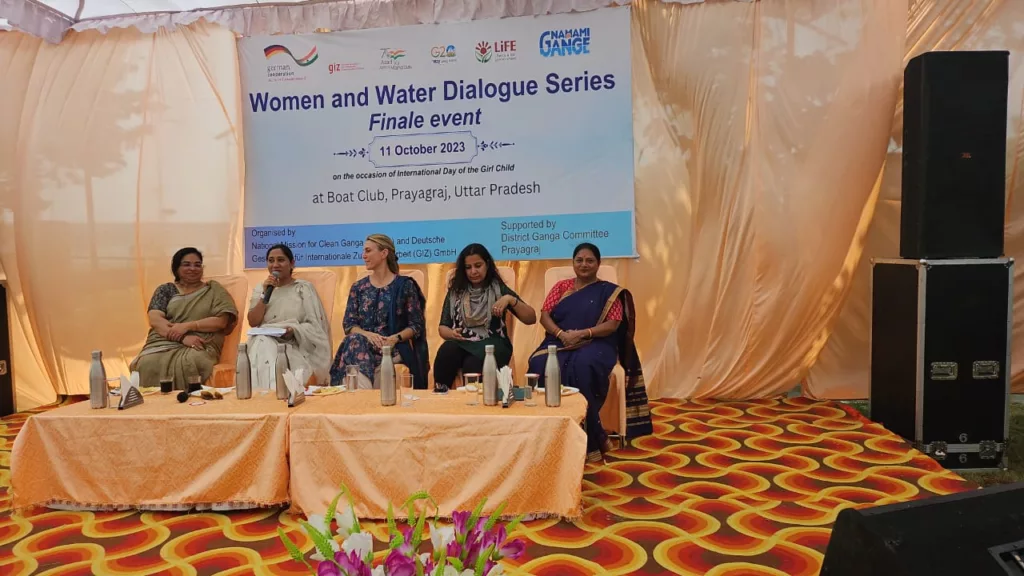
Ms. Laura Sustersic, Programme Director at SGR, GIZ, discussed the European approach to women’s participation in parliament. She noted that several European countries are actively promoting inclusivity by ensuring women’s presence in legislative bodies. Ms. Sustersic pointed out that within all their projects, there is a specific requirement to include activities that address and enhance women’s involvement. This emphasis on women’s participation has led to the development of initiatives like the dialogue series, highlighting the importance of this approach in fostering gender equality and diversity in political decision-making.
Dr. Swayamprabha Das from Development Alternatives drew attention to the significant role of women in policymaking during her presentation. She expressed her delight in observing a convergence of ideas, collaboration, and increased emphasis on women’s involvement in this process. Dr. Das highlighted the prevalent challenges faced by women in policymaking, including the common belief that policies are typically authored by men. In the context of the water sector, she recommended a bottom-up approach to capacity development in policy processes, starting from the grassroots level, extending to panchayats, district, and state levels. This approach aims to empower women and ensure their active participation in shaping policies within the sector.
Dr. Ekta Pathak Mishra, the Co-founder and CEO of Equator Geo Pvt. Ltd., shared her enlightening journey during the event. She began by reminiscing about her experiences in the United States, where she marveled at the ready availability of resources, from advanced laboratories to accessible research opportunities. Dr. Mishra then delved into her work in water conservation and the assessment of the Ganga River’s water quality, specifically in Prayagraj. She emphasised the challenges she encountered, particularly the striking gender-based disparities in career choices between girls and boys. Dr. Mishra recounted a notable initiative where she provided training in remote sensing technology to girls. Surprisingly, nearly 80% of these young women embraced remote sensing and geospatial technology, showcasing their prowess in delivering substantial research insights. Their outcomes have significantly influenced decision-making processes, highlighting the transformative power of promoting gender diversity in scientific and technological fields.
Ms. Anamika Chaudhary, Ganga Vichar Manch NMCG, shared her inspirational efforts during this discussion. She highlighted about her role in motivating and encouraging people to actively participate in the cleaning and preservation of the sacred Ganga river. She emphasised the significance of her dedicated team, stationed at various riverbanks or “ghats,” whose mission is to raise awareness and engage more individuals in the crucial mission of cleaning the Ganga and its tributaries, including the Yamuna in the state. She reiterated the belief that the Ganga is a precious gift from our ancestors and underlined the responsibility of safeguarding and preserving this invaluable natural resource for the benefit of future generations.
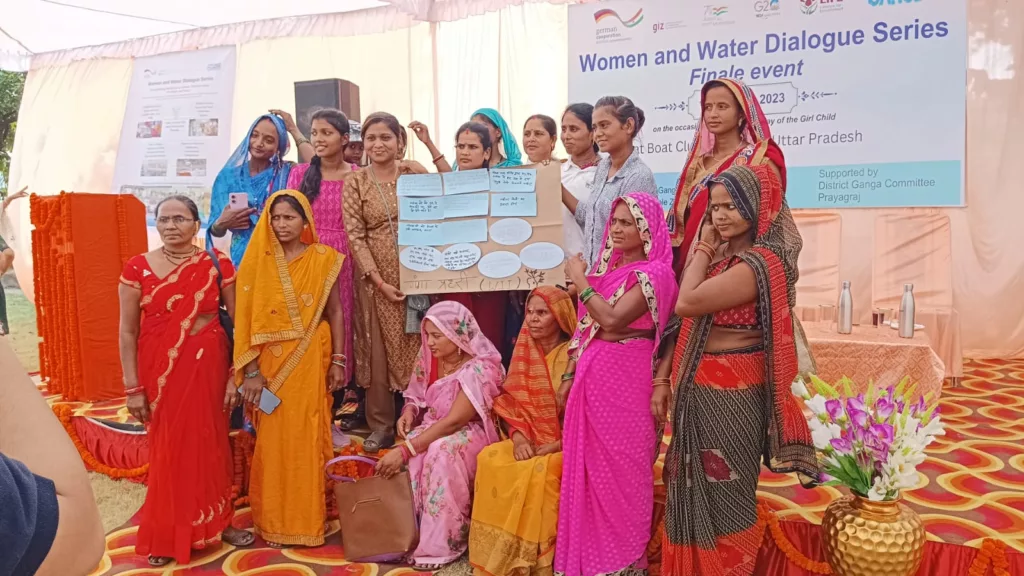
The event then shifted to a group activity session, facilitated by Ms. Madhura Phatak and Ms. Anupama Madhok. Attendees were divided into groups representing educators, entrepreneurs, government sector representatives, and volunteer groups/NGOs. They engaged in discussions about the unique challenges faced by women in various sectors, explored strategies to increase women’s participation, and identified actions needed to empower women in decision-making processes. Later, all the challenges and action points were presented by the womens.
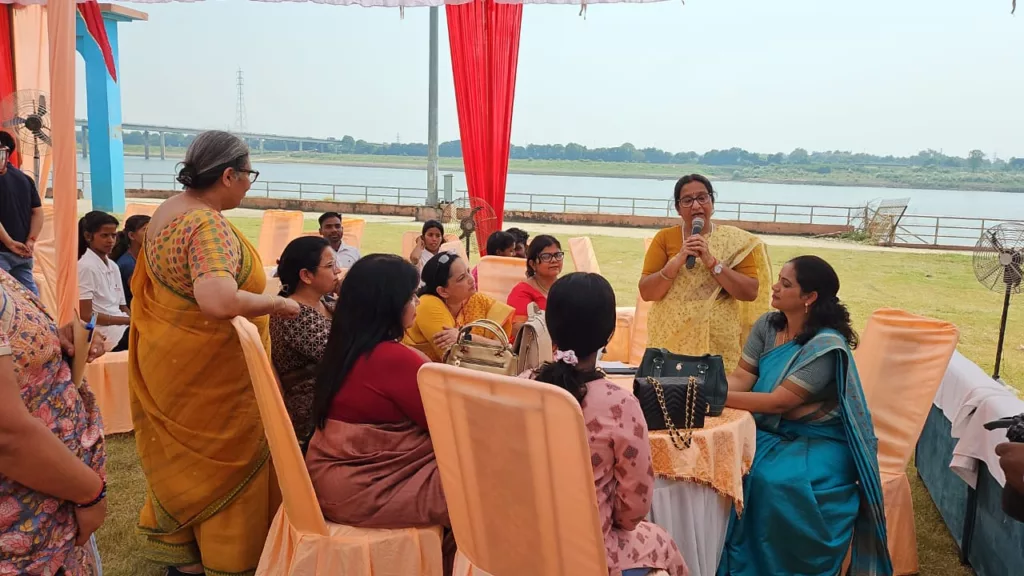
Suparna Debroy,Eminent Personality, highlighted about book by UNDP. She emphasised a key quality that distinguishes these accomplished women as leaders: their courage, innovation, and self-motivation. She highlighted that these women have demonstrated their resilience by overcoming societal challenges to reach their leadership positions, underscoring the fundamental idea that leaders are not born but made.
Mr G Asok Kumar, DG NMCG, while discussing ‘Gender Inclusion -Government Interventions,’ emphasised the vital role of the girl child in shaping the future and praised GIZ’s Women and Water Dialogue program, covering key towns along the Ganga. DG, NMCG highlighted his past experience in promoting women’s participation in water and sanitation projects and the significant impact this has on public health. He also stressed the ongoing commitment to empower women in various government initiatives, particularly in the Jal Jeevan Mission and Swachhta Abhiyan, led by Prime Minister Narendra Modi. Shri Kumar discussed the Jalaj initiative, aimed at supporting women in the Ganga basin by marketing their locally-produced goods and improving their livelihoods. DG, NMCG also highlighted the positive impact of these programs on water quality and aquatic life in the Ganga, particularly the Gangetic Dolphins.
During her address,Ms. Saumya Pandey,Additional Labour Commissioner, Kanpur, emphasised the significance of the “Catch the Rain” initiative and the launch of the “Jal Abhishek Kaaryakram.” She highlighted the vulnerability of women during water crises and expressed gratitude to GIZ for their support. She also discussed the implementation of water budgets in gram panchayats, community gatherings, the creation of “Amrit Sarovar,” and the development of a comprehensive river body map with GIZ’s assistance. She introduced the slogan “Prerana se Prerna ko, Prerna tak” and shared the impact of the “Dehaheyti Mart,” empowering women through economic opportunities.
The event was not only a platform for insightful discussions but also an occasion to celebrate the confluence of rivers and women. As the day came to a close, the cultural evening, ‘Nadi aur Nari,’ paid tribute to this beautiful intersection through a mesmerising musical program. It was a heartfelt celebration of the integral role that women played in the world of water management, both as its stewards and as the embodiment of its essence.
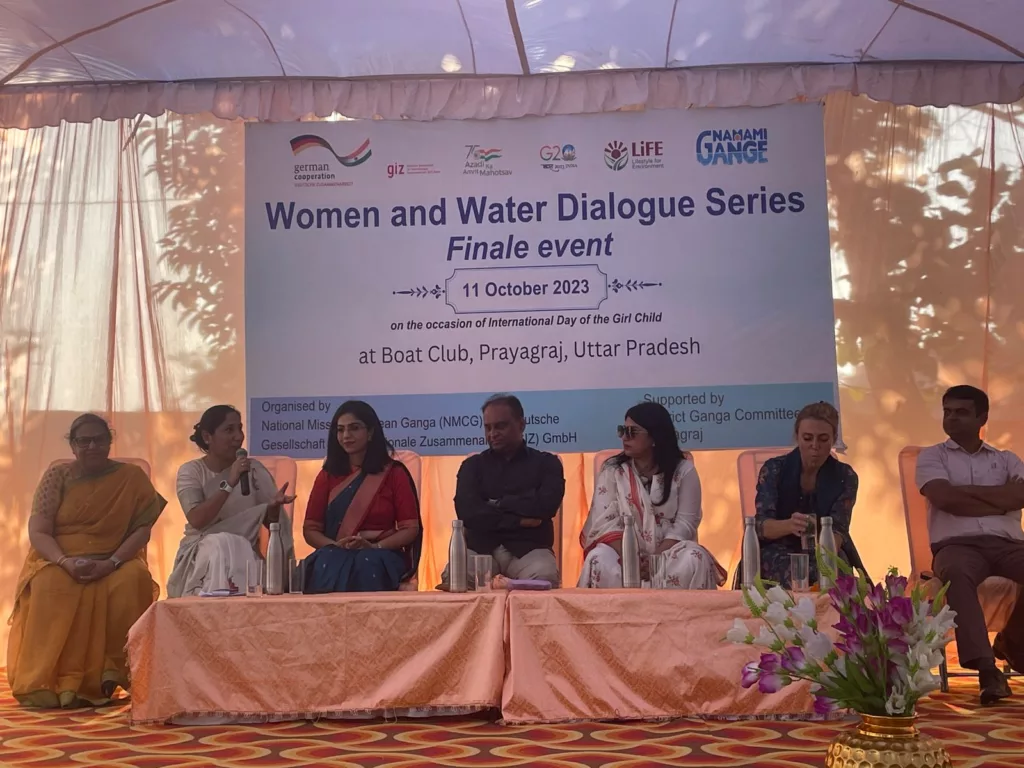
This initiative’s success underscored the importance of embracing a gender-inclusive approach to water resource management. The knowledge shared during these dialogues will continue to drive positive changes in the water sector, and it was not the end but a way forward to act on the outputs.
